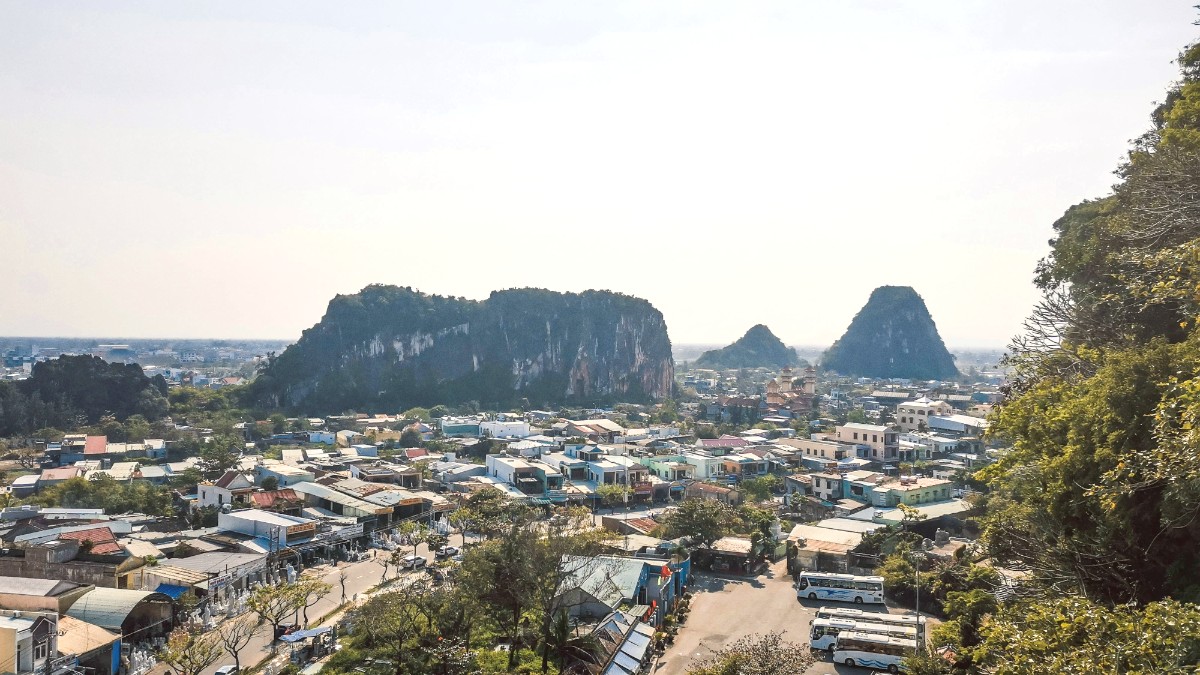
Central Vietnam, Vietnam
Dry Season (January - July): This period brings pleasant weather to Da Nang. Average temperatures range from 25°C to 32°C (77°F to 90°F). June and July are the hottest months, with temperatures often reaching their peak. Expect low rainfall and abundant sunshine. Days are typically clear and bright, perfect for outdoor activities. Humidity levels remain moderate to high, though generally more comfortable than in the wet season.
Wet Season (August - December): This season brings more rain. Average temperatures range from 20°C to 28°C (68°F to 82°F). December and February are the coolest months, offering a break from intense heat. Prepare for high rainfall, often arriving as heavy, prolonged downpours. Typhoons pose a risk from September to November. Humidity levels are high, which can feel muggy.
Typhoons: Central Vietnam, including Da Nang, is prone to typhoons and tropical storms, especially from September to November. These storms cause flooding, travel disruptions, and closure of attractions. Monitor local weather forecasts from reliable sources if traveling during this period. Have backup plans for indoor activities or be prepared for schedule changes.
Ideal timing for specific activities or experiences: Beach activities, swimming, snorkeling: Plan these from February to August for warm, clear waters and ample sunshine. Hiking (Marble Mountains, Son Tra Peninsula): The period from February to May offers comfortable temperatures. Cooler, dry days in January also work well. Avoid hiking during the peak heat of June-July or during heavy rains. Sightseeing (city, Hoi An, My Son): February to May offers the most comfortable weather for extensive exploration of these historical and cultural sites.
February - May
Sunny days, low humidity, pleasant temperatures. Good for beach and sightseeing.
Higher prices, more visitors at attractions.
January, June - July
Balance of weather, fewer crowds. January is cooler.
June-July are very hot and humid.
August - December
Lowest prices, fewer visitors.
High chance of rain, potential typhoons.
Plan these from February to August for warm, clear waters and ample sunshine.
The period from February to May offers comfortable temperatures. Cooler, dry days in January also work well. Avoid hiking during the peak heat of June-July or during heavy rains.
Feb - Aug (warm, clear waters)
Feb - May (comfortable temps)
Feb - May (comfortable for walking)
Hiking in June-July (heat) or during heavy rains
Arrive early for popular spots like Marble Mountains to avoid both crowds and the midday heat.
Prepare your visa and entry documents well before your trip for a smooth arrival in Vietnam. Requirements vary by nationality and length of stay.
Citizens of several countries do not need a visa for short visits (e.g., 15 days for many European nations, Japan, South Korea). Citizens of 80 countries can apply for an e-visa online.
Ensure your passport remains valid for at least 6 months beyond your intended departure date from Vietnam. It needs at least two blank pages for visa stamps.
Plan your budget for Da Nang based on your travel style. Vietnam has experiences for every budget, from very economical to luxurious.
Prioritize your health and safety when traveling to Da Nang. A few precautions contribute to a healthy and enjoyable trip.
Vaccinations: No vaccinations are legally necessary for entry unless you arrive from a Yellow Fever risk area. Consult a travel health professional at least 4-6 weeks before your trip for recommended vaccinations (e.g., Hepatitis A & B, Typhoid).
Common Health Concerns: Traveler's Diarrhea is common. Prevent it by drinking only bottled water, water that has been boiled, or water you purify yourself. Avoid ice in drinks unless you confirm it comes from purified water. Eat food cooked thoroughly and served hot. Wash hands often or use Hand sanitizer. Dengue fever is present. Use a Mosquito repellent with DEET or Picaridin (30-50%). Wear long sleeves and pants at dusk and dawn. Consider sleeping under a Mosquito net.
Da Nang sees very hot and humid conditions. Stay hydrated by drinking plenty of fluids. Carry a Reusable water bottle.
Wear a Wide-brimmed hat, Sunglasses, and high-SPF Sunscreen (SPF 30+).
Avoid seeking sun during peak hours (10 AM to 3 PM).
Da Nang is generally a safe city for tourists. Violent crime against visitors is rare. Petty crime like pickpocketing and bag snatching can occur in crowded areas.
Stay aware of your surroundings; secure belongings on motorbikes or busy roads.
Be aware of inflated taxi fares. Use metered taxis or Grab for transparent pricing.
Typhoon season spans September to November, bringing heavy rains and potential flooding in low-lying areas. Da Nang experiences this risk.
Stay informed via local news and weather forecasts during typhoon season.
Extreme heat in June and July poses heatstroke risk; stay hydrated.
| Category | Details | Recommended Action |
|---|---|---|
| Travel Insurance | A comprehensive Travel insurance policy comes highly recommended. Ensure it covers medical emergencies, emergency evacuation, trip cancellation/interruption, and lost luggage. Consider SafetyWing or Insubuy. | Verify coverage for planned activities (motorbiking, adventure sports). |
| Emergency Numbers | Police: 113, Fire: 114, Ambulance/Medical: 115, Local Tourist Police (Da Nang): (0236) 3891 161. | Save these numbers to your phone before travel. |
| Personal Contacts | Keep contact details for your country's embassy/consulate in Vietnam accessible. | Share your itinerary and emergency contacts with a trusted person at home. |